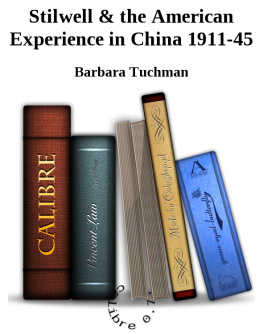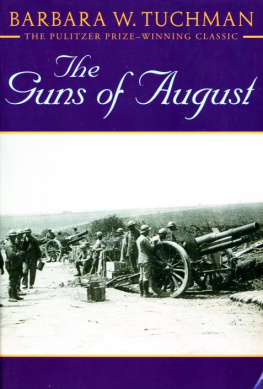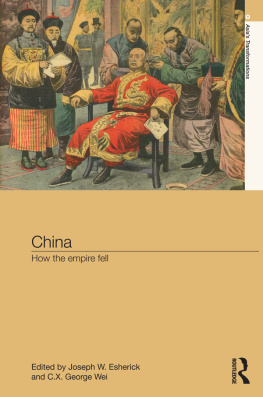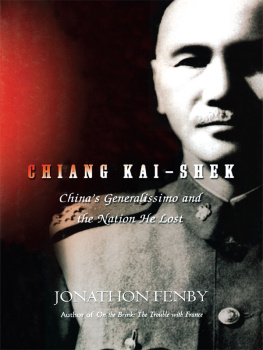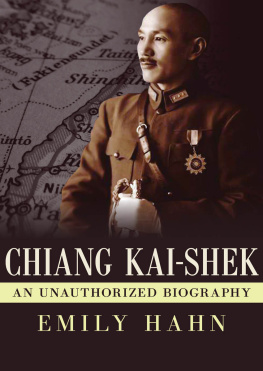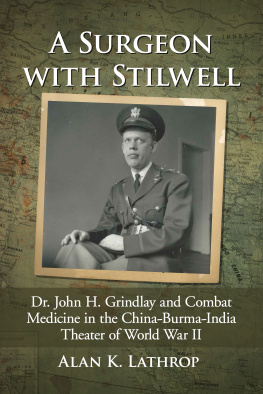
Barbara W. Tuchman
STILWELL
AND THE
American Experience in China, 1911-45
Copyright 1970, 1971 by Barbara W. Tuchman
First Printing
Contents
Foreword xi
Prologue: The Crisis I
PART ONE
1 Foundations of an Officer 9
2 Visitor to Revolution: China, 191 i 25
3 The Great War: St. Mihiel and Shantung 42
4 Assignment to Peking: Years of the
Warlords, 1920-23 61
5 The "Can Do" Regiment and the Rise of
Chiang Kai-shek, 1926-29 90
6 "Vinegar Joe," 1929-35 123
7 Military Attache: China's Last Chance, 1935-37 143
8 Military Attache: Sino-Japanese War, 1937-39 164
PART TWO
9 The Rush to Prepare
1939-41 203
10 "I'll Go Where I'm Sent"
December 1941-February 1942 229
11 "A Hell of a Beating"
March-May 1942 256
12 The Client
June-October 1942 301
13 "Peanut and I on a raft"
August 1942-January 1943 326
14 The President's Policy
January-May 1943 349
15 Stilwell Must Go
June-October 1943 375
16 China's Hour at Cairo
November-December 1943 396
17 The Road Back
December 1943-July 1944 415
18 "The Future of All Asia Is at Stake"
June-September 1944 455
19 The Limits of "Can Do"
September-November 1944 483
20 "We Ought to Get Out-Now"
1945-46 510
Appendix Road-Building, 1921: Haphazard
Conversations by Major Joseph W. Stilwell 535
Bibliography and Other Sources 541
Illustrations
PART ONE
FOLLOWING PAGE I74
Stilwell as a cadet
Winifred A. Smith
Stilwell in the Philippines, 1905
Stilwell as instructor at West Point, 1914
Stilwell at Verdun, 1918
From Stilwell's album: north China scenes
Marshal Wu Pei-fu
Stilwell on road-building mission
Marshal Chang Tso-lin, Chang Hsueh-liang, General Connor
Marshal Feng Yu-hsiang
Feng's troops at trade school
Feng with Chiang Kai-shek, 1928
From Stilwell's album: road-building
American compound, Tientsin, 192 7 Staff of the Fort Benning Infantry School, 1932 Foreign attaches at Peking, 1935 Chiang Kai-shek at Hungchow, 1936 Stllwell as Military Attache, 1936 The Stilwells' household staff, Peking Chinese troops, 1938 Mrs. Stilwell and guests, Peking Chinese war poster
After the bombing of Shanghai, 1937 Japanese troops invading Anhwei, 1938 Japanese generals at the fall of Hsuchow, 1938 Japanese column, Kiangsi, 1938
Stilwell with Chinese troops, Kaijeng, 1938 Japanese soldiers, photographed by the author, 1935 Bombing of Chungking, 1940
PART TWO
FOLLOWINGPAGE430
General Marshall
T. V. Soong and Secretary Morgenthau, 1942
Stilwell with Generalissimo and Madame Chiang Kai-shek, 1942
The Walkout, 1942:
Stilwell and bearers
The last radio message
Stilwell leading the column on the trail
Stilwell in the river
On rafts on the Uyu River
Stilwell leading the column down the Uyu Generals Yu Fei-p'eng and Ho Ying-chin Stilwell and Chennault Stilwell and war correspondents Stilwell at Ramgarh The Cairo Conference, 1943
Stilwell with Generals Sun Li-jen and Liao Yao-hsiang, 1944 Troops of the 38th Division, 1944 Class at Infantry Training Center, Kweilin, 1944 Artillery pack train, 22nd Division, 1944 Monsoon, Ledo Road, 1944 Stilwell at forward headquarters, 1944 Admiral Mountbatten, 1944
Stilwell in the field: Christmas 1943 and at Taihpa Ga, 1944 Kuomintang generals, 1944 Refected for the Chinese Army, 1945 Yenan, 1944:
Colonel Barrett with Chou En-lai and Mao Tse-tung
The American Military Mission Evacuation of Kweilin, 1944 Evacuation of Liuchow, 1944 Arrival of Hurley and Nelson at Chungking, 1944 Stilwell with the press at Carmel, 1944
Maps
Maps drawn by
Brigadier General Frank Dorn, U.S.A. (Ret.)
China Front endpaper
North China and Peking 64
Stilwell's travels on land and sea in the 1920s and 30s 162
Burma, 1942 268
North Burma, 1944 417
The Far East Back endpaper
Foreword
The theme of this book is the relation of America to China, in a larger sense to Asia. The vehicle of the theme is the career of General Stilwell. Why Stilwell? Because he combined a career focused on China with background and character that were quintessentially American; because his connection with China spanned the period that shaped the present from the dramatic opening moment of 1911, year of the Revolution, to 1944, decisive year in the decline of the Nationalist Government; because his service in the intervening years was a prism of the timesas language officer from 1920 to 1923 in the time of the warlords, as officer of the 15th Infantry in Tientsin from 1926 to 1929 at the time of the rise to power of Chiang Kai-shek, as Military Attache from 1935 to 1939 at the time of Japanese invasion, lastly as theater commander in World War II; because in the final and critical years of this period he was the most important figure in the Sino-American relationship. Impatient, acid, impolitic, "Vinegar Joe" was not the ideal man for the role. But in knowledge of the language and country, friendship for the people, belief and persistence in his task, combined with official position and power, he personified the strongest endeavor and, as it was to prove, the tragic limits, of his country's experience in Asia.
I am conscious of the hazards of venturing into the realm of America's China policy, a subject that, following the defeat of Chiang Kai-shek by the Communists and the waste of an immense American effort, aroused
one of the angriest and most damaging campaigns of vilification in recent public life. Nevertheless, since China is the ultimate reason for our involvement in Southeast Asia, the subject is worth the venture even though the ground is hot. It is only fair to add that this book, which ends in 1946, is concerned with origins that reach back beyond yesterday. "You will hear a lot of talk," General Stilwell wrote for the graduating class of West Point in 1945, "about how this or that generation messed things up and got us into war. What nonsense. All living generations are responsible for what we do and all dead ones as well."
I should like to add a word of explanation about General Stilwell's diaries, which were naturally a major source for his biographer. I became thereby a trespasser since the diaries were intended for no eyes but his own. "This little book," he explicitly warned on the flyleaf of the pocket diary for 1906, "contains None of Your Damned Business!" Believing in the right of privacy, I do not share the view that posterity has some sort of "right" to know the private life of a public figure if he wishes otherwise but in Stilwell's case the needs of history had already prevailed over privacy. After the war it became important and necessary to let Stilwell's voice speak for itself about the events of his controversial command. With the consent of his family his wartime diaries and letters for the period 1942-44 only were edited by the former correspondent in China, Theodore White, and published under the title The Stilwell Papers in 1948. The originals together with other wartime documents were also made available to Charles Romanus and Riley Sunderland, authors of the official Army history of the China-Burma-India theater, and were subsequently donated for public use to the Hoover Library in Stanford, California. This decision having been taken, it was logical to give a biographer access to the rest of the Stilwell archive covering his career prior to Pearl Harbor. Mrs. Stilwell made available to me the diaries, letters, documents, scrapbooks, family albums and other material in her possession, hitherto unpublished. These are described further in the Bibliography.

